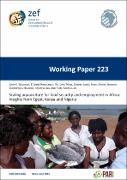| dc.contributor.author | Walakira, John K. | |
| dc.contributor.author | Hinrichsen, Etienne | |
| dc.contributor.author | Tarus, Victoria | |
| dc.contributor.author | Langi, Sandra | |
| dc.contributor.author | Ibrahim, Nabil Ahmad | |
| dc.contributor.author | Badmus, Olanrewaju | |
| dc.contributor.author | Aziz, Andrew | |
| dc.contributor.author | Baumüller, Heike | |
| dc.date.accessioned | 2023-10-05T21:08:42Z | |
| dc.date.available | 2023-10-05T21:08:42Z | |
| dc.date.issued | 2023-06 | |
| dc.identifier.citation | Walakira, J., Hinrichsen, E., Tarus, V., Langi, S., Ibrahim, N. A., Badmus, O., Aziz A. and Baumüller, H. (2023): Scaling aquaculture for food security and employment in Africa – Insights from Egypt, Kenya and Nigeria. ZEF Working Paper No. 223. Bonn: Center for Development Research. | en_US |
| dc.identifier.issn | 1864-6638 | |
| dc.identifier.uri | http://dir.muni.ac.ug/xmlui/handle/20.500.12260/562 | |
| dc.description.abstract | Aquaculture is the fastest growing food sector in the world and now accounts for more than half of the fish consumed globally. However, the sector in Africa remains in its infancy, with the notable exception of Egypt, one of the world’s largest producers. This paper provides a thorough analysis of the sector in the selected countries of Egypt, Kenya and Nigeria to help identify investment and policy priorities that can sustainably advance aquaculture across Africa to boost income and employment, rural development and food security. The analysis focuses on nine themes to ensure a comprehensive overview of the sector and to better understand the relative strengths and weaknesses in each country: sector trends, national policy frameworks, government institutions, natural resources to support aquaculture, sector-specific innovation, feed and seed, market access, public-private partnerships, and sectoral impacts. With these in mind, the paper provides a series of recommendations for African policymakers and investors aimed at improving sectoral development across the continent. Among other factors, the recommendations highlight the need to not only increase productive capacity but also linkages to markets and consumers, adopt national policies that provide targeted support to high-potential areas, increase local research capacities and scaling of research results, decentralize seed and feed production for improved access, and promote sustainably produced fish as a promising source of animal-derived protein. | en_US |
| dc.description.sponsorship | Program of Accompanying Research on Agricultural Innovation (PARI) | en_US |
| dc.language.iso | en | en_US |
| dc.publisher | Center for Development Research | en_US |
| dc.relation.ispartofseries | ;223 | |
| dc.subject | Aquaculture production | en_US |
| dc.subject | Technology and innovation | en_US |
| dc.subject | Feed and seed | en_US |
| dc.subject | Aquaculture investment | en_US |
| dc.subject | Aquaculture policy priorities | en_US |
| dc.title | Scaling aquaculture for food security and employment in Africa – Insights from Egypt, Kenya and Nigeria | en_US |
| dc.type | Working Paper | en_US |

